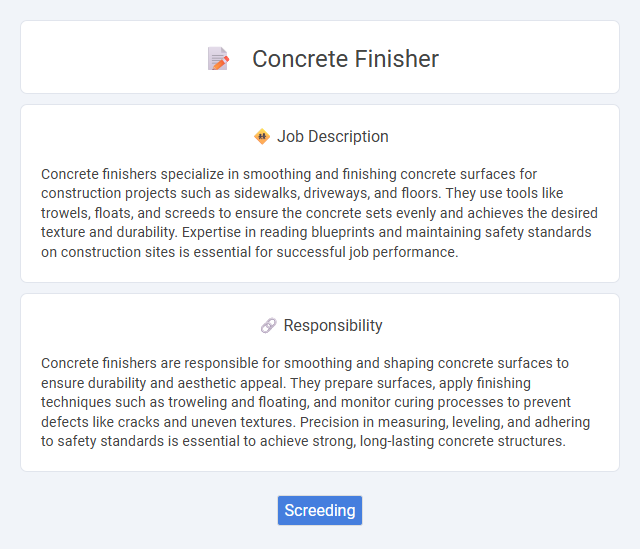
Concrete finishers specialize in smoothing and finishing concrete surfaces for construction projects such as sidewalks, driveways, and floors. They use tools like trowels, floats, and screeds to ensure the concrete sets evenly and achieves the desired texture and durability. Expertise in reading blueprints and maintaining safety standards on construction sites is essential for successful job performance.
Individuals with strong physical endurance and good hand-eye coordination are likely to be well-suited for a concrete finisher job, as the work often involves kneeling, bending, and handling heavy tools. Those who can tolerate outdoor conditions and repetitive tasks may find this role more compatible with their abilities. Conversely, people with mobility issues or low stamina might face challenges performing the necessary duties effectively.
Qualification
Concrete finishers must possess strong knowledge of concrete mixtures, finishing techniques, and curing processes to ensure durability and smooth surfaces. Certification programs in concrete finishing and OSHA safety training enhance qualification and job performance. Experience with hand tools, power tools, and blueprint reading is essential for precise concrete work and project adherence.
Responsibility
Concrete finishers are responsible for smoothing and shaping concrete surfaces to ensure durability and aesthetic appeal. They prepare surfaces, apply finishing techniques such as troweling and floating, and monitor curing processes to prevent defects like cracks and uneven textures. Precision in measuring, leveling, and adhering to safety standards is essential to achieve strong, long-lasting concrete structures.
Benefit
Concrete finishing jobs likely offer benefits such as competitive wages and comprehensive health insurance packages. Workers may gain opportunities for skill development and career advancement within the construction industry. There is also a strong probability of gaining job stability due to consistent demand in infrastructure and building projects.
Challenge
Concrete finishing may present challenges such as working with time-sensitive materials that require precise timing and skill to achieve smooth, durable surfaces. The job likely involves handling physically demanding tasks and adapting to varying weather conditions, which can affect concrete setting times and overall quality. Navigating complex project specifications and ensuring compliance with safety standards might also be a frequent aspect of the work.
Career Advancement
Concrete finishers with strong skills in surface smoothing and finishing techniques can advance to supervisory roles or project management positions in construction. Gaining certifications in safety and specialized concrete applications enhances job prospects and salary potential in the industry. Experienced finishers often transition to roles such as site supervisors, estimators, or quality control specialists to broaden their career opportunities.
Key Terms
Screeding
Concrete finishers specializing in screeding expertly level and smooth freshly poured concrete surfaces to ensure uniformity and structural integrity. Using tools such as screed boards and laser screeds, they achieve precise elevations and flatness critical for flooring and foundation work. Mastery of screeding directly impacts the durability and safety of concrete installations in commercial, residential, and infrastructure projects.
 kuljobs.com
kuljobs.com